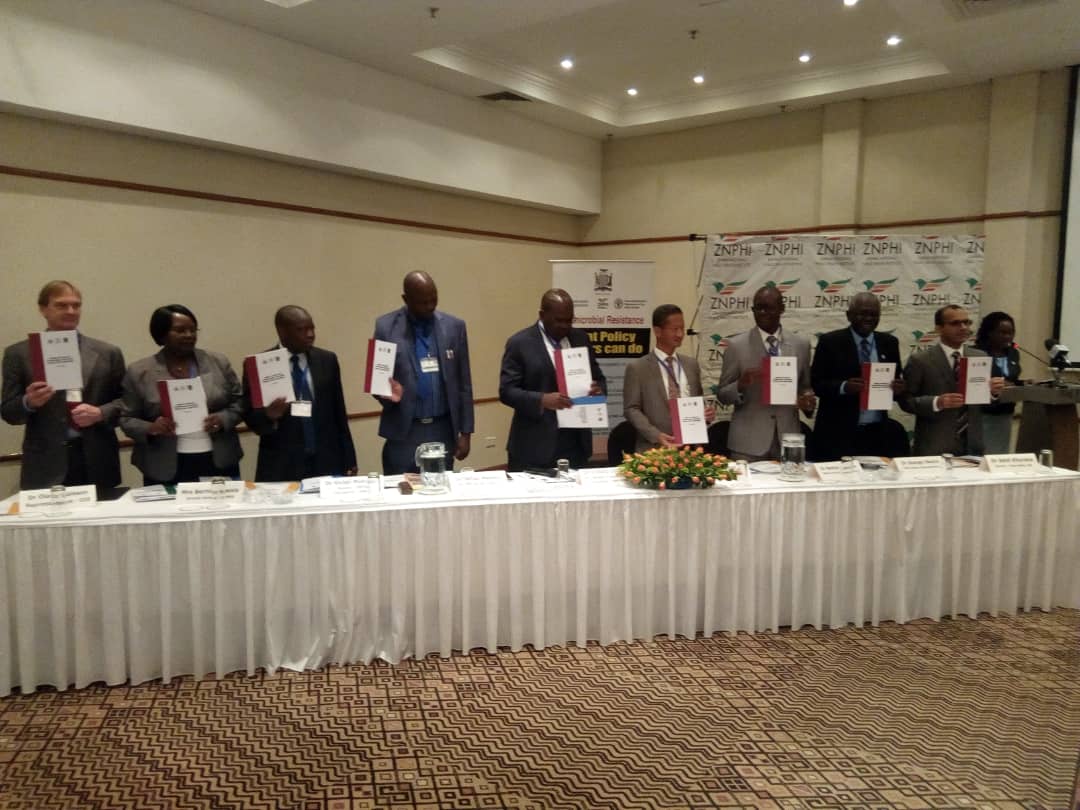Environment
Ignore Antimicrobial Resistance At Your Own Risk – India High Commissioner

The Indian High Commissioner to Zambia Mr. Ngulkham Gangte has warned that any country that ignores the effects of Antimicrobial Resistance (AMR) does so at its own peril.
Gangte gave the warning at the three-day Pan-Africa Workshop on Effective Implementation of National Action Plans on Antimicrobial Resistance holding in Zambia.
The workshop which has in attendance experts from 11 countries is organized by the Zambia National Public Health Institute, Ministry of Health, Zambia in conjunction with the Centre for Science and Environment (CSE) the India-based think tank.
It is also attended by journalists from five African countries that shared their experiences from the ground and got to know what is being done to contain this crisis of AMR.
AMR is the ability of a microorganism (like bacteria, viruses, and some parasites) to stop an antimicrobial (such as antibiotics, antivirals and antimalarial) from working against it.
According to Gangte, the ability of organisms to resist antimicrobial treatment especially antibiotics had a direct impact on human and animal health that carried a heavy economic burden due to the high cost of treatment, and reduced productivity caused by prolonged sickness.
“AMR also impact food safety, nutrition security, livelihoods and consequently, attainment of several Sustainable Development Goals (SDGs).
“Therefore, we all must work together to prevent the menace of AMR in our countries,” Gangte advised.
Also, Zambian Minister of Health Dr. Chitalu Chilufya called on African countries to urgently act on the development and implementation of National Action Plans (NAPs) for Antimicrobial Resistance (AMR).
Chilufya said the objective of the workshop is to discuss the threat of AMR to humans, animals, and the environment; its spread, and impact in Africa and to understand the implementation of the NAPs on AMR.
“AMR is the consequence of the abuse and misuse of antibiotics which poses a greater threat to public health security that robs countries of their aspirations for universal health coverage.
“There is the need for African countries to invest in resilient public health systems which will gear towards reducing the inappropriate use of antibiotics among the public’’.
He, therefore, called on the media to partner with their respective governments in educating the public on the need to stop the abuse and misuse of antibiotics.
On his own, the Director, Food Safety and Toxins Programme, CSE, India, Mr Amit Khurana, while setting the context for the workshop called for innovative ways to manage the issue of access and excess of antibiotics usage.
Khurana said that the misuse and overuse of antibiotics in food-animal production is a key driver of AMR in humans who ultimately consume the animals and animal products.
“The global success to contain AMR will hugely depend on how we handle it, so we must use greater discretion in our approaches and implementations.
“The threat of AMR is real and globally reaching crisis levels, therefore there must be caution in the production of food and management of waste.
“We cannot afford to allow misuse of antibiotics and chemicals first in our system and then after spend a lot to clean it up from their food and environment”
Part of the highlights of the workshop was the launch of five key reports namely;
“Down To Earth’s (DTE) `FROM CURE TO KILLERS, Road Map to Phase out Non-Therapeutic Antibiotic Use and Critically Important Antibiotics in Food-Animals in Zambia, Baseline Information for Integrated Antimicrobial Resistance Surveillance in Zambia, Zambia’s Multi-Sectorial National Action Plan on Antimicrobial Resistance, and Zambia’s Integrated Antimicrobial Resistance Surveillance Framework”.
NAN
Environment
Rt. Hon. Sam Onuigbo: Taking the Spirit of Nigeria’s Climate Act to the Global Stage at COP30

By Gloria Ada Oguamanam
As the world converges in Belém, Brazil, for the highly anticipated COP30 Climate Conference scheduled from November 10 to 21, 2025, Nigeria stands once again at the forefront of global environmental discourse.
Among the nation’s delegation of eminent figures is Rt. Hon. Sam Ifeanyichukwu Onuigbo KJW, the acclaimed Father of Nigeria’s Climate Change Act 2021, a title he has earned through years of relentless advocacy, legislative foresight, and consistent representation on the global stage.
The leader of the Nigerian delegation is Vice President Kashim Shettima. Rt. Hon. Onuigbo will be attending alongside Minister of Environment Balarabe Abbas Lawal, Director General of the National Council on Climate Change Mrs. Omotenioye Majekodunmi, Minister of Foreign Affairs Yusuf Maitama Tuggar, National Assembly members, climate change advocates, and several other experts. Together, they represent Nigeria’s renewed commitment to sustainable governance, clean energy transition, and climate resilience under the administration of President Bola Ahmed Tinubu.
A Legacy of Commitment and Continuity:
Rt. Hon. Sam Onuigbo’s participation at COP30 reflects not only his personal dedication but also his ongoing role as a key custodian of Nigeria’s environmental vision. Over the years, his presence has been felt at numerous international climate forums, including COP21 (Paris, 2015), COP22 (Marrakesh, 2016), IRENA Assembly (Abu Dhabi, 2017) COP23 (Bonn, 2017), IRENA Assembly (Jan 2020), COP26 (Glasgow, 2021), COP27 (Sharm El-Sheikh, 2022), COP28 (Dubai, 2023), and COP29 (Baku, 2024), each representing a chapter in his unwavering mission to integrate legislative action with practical climate solutions. It was his pivotal sponsorship of the Climate Change Act 2021, signed into law on November 17, 2021, by late President Muhammadu Buhari, that institutionalized Nigeria’s climate governance framework, positioning the country as a continental leader in environmental policy.
The Act established a coordinated approach for emissions reduction, carbon management, and adaptation, with Rt. Hon. Onuigbo serving as its moral compass and policy anchor.
Presidential Reinforcement of Climate Governance:
President Bola Ahmed Tinubu’s administration has further cemented Nigeria’s direction by activating and reinforcing key pillars of the Climate Change Act. The President’s recent actions included the approval of the National Carbon Market Framework, in line with Sections 4(i) and 4(j), the Operationalization of the Climate Change Fund consistent with Section 15 of the Act, and the reaffirmation of his authority as the Chairman of the National Council on Climate Change.
In addition, the administration has shown commitment to strengthening the institutional framework of the National Council on Climate Change (NCCC) through budgetary recognition and integration within the national fiscal planning process. This marks a significant step toward ensuring that climate governance is embedded within Nigeria’s economic and developmental agenda, promoting transparency, accountability, and long-term sustainability.
Through these decisive moves, President Tinubu has effectively stamped his seal of authority on the 2021 Climate Change Act, not as a formality, but as an operational strategy to elevate Nigeria’s climate response.
A Framework Rooted in the President’s 2023 Budget Vision:
In his November 2023 budget address, President Tinubu notably underscored the economic and development opportunities that can potentially be achieved while battling the devastating impacts of climate change. Early paragraphs of that address outlined his intent to “mainstream climate resilience into Nigeria’s fiscal planning while developing the nation’s carbon market infrastructure and promoting a green economy.” In three successive paragraphs, he declared:
- “As we approach COP28 climate summit, a pivotal moment for global climate action, I have directed relevant government agencies to diligently work towards securing substantial funding commitments that will bolster Nigeria’s energy transition.”
- “It is imperative that we seize this opportunity to attract international partnerships and investments that align with our national goals. I call upon our representatives to engage proactively to showcase the strides we have made in the quest to create an enabling environment for sustainable energy projects.”
- “Together, we will strive for Nigeria to emerge from COP28 with tangible commitments, reinforcing our dedication to a future where energy is not only a catalyst for development but also a driver of environmental stewardship.”
In line with his commitment to climate action, after giving the above-referenced budget speech, President Tinubu personally attended COP28, where he exercised leadership by participating in many high-level meetings. His direct involvement added momentum to Nigeria’s successful participation in COP28.
Onuigbo as The Living Symbol of Nigeria’s Climate Mandate
As he prepares for COP30, Rt. Hon. Onuigbo’s presence embodies continuity, expertise, and moral conviction. His legislative stewardship transformed a once-abstract climate conversation into a living national framework. Over the years, he has not only participated in the making of climate policy but has lived as its advocate, bridging the gap between law, leadership, and lived impact.
In his recent interview with NTA Abuja, before heading out to Belém, Brazil, Rt. Hon. Onuigbo reaffirmed this same unwavering commitment to climate action and environmental protection. He emphasized the transformative impact of the Climate Change Act 2021 and its foundational and institutional provisions for the Nigerian Carbon Market Framework. He also highlighted the urgent environmental challenges facing his constituency, especially the severe erosion devastations in Obuohia-Ibere, Ikwuano and other badly threatened communities in Nigeria.
Speaking with empathy and conviction, he drew attention to the social and economic effects of these issues of loss of farmlands, displacement of families, and restricted community access, calling on government agencies to act decisively. He also restated his dual role as the Vice-President (Africa) of GLOBE International and his position as Senior Advisor with Climate Parliament, Chairman, Committee on Security, Climate Change, and Special Interventions on the Governing Board of the North East Development Commission, positions through which he continues to champion collaboration, climate education, and policy implementation.
Above all, his message was clear: the time for urgent action is now, and Nigeria must continue to lead by example through accountability, inclusion, and sustained advocacy.
In a recent statement, Rt. Hon. Onuigbo had expressed optimism that Nigeria’s strengthened institutional structure under the current administration would “enable the nation to fully leverage global partnerships and domestic innovation for sustainable growth.” His attendance at COP30 thus symbolizes Nigeria’s unity of purpose, from legislative vision to executive implementation.
A Defining Moment for Nigeria and the World:
With global attention turning toward Brazil for COP30, Nigeria’s delegation carries both the weight of responsibility and the hope of transformation. Rt. Hon. Sam Onuigbo’s role as the Champion of the Climate Change Act reinforces Nigeria’s identity as a nation of resilience, intellect, and foresight one that recognizes the urgency of aligning governance with planetary well-being.
As the conference unfolds from November 10 to 21, 2025, Nigerians and the international community watch expectantly.
The convergence of the executive leadership under President Tinubu and legislative champions like Rt. Hon. Onuigbo offers a transparent, forward-looking framework for Nigeria’s climate future; one rooted not in rhetoric but in real, measurable action.
Indeed, this is not just another global summit; it is a continuum of Nigeria’s environmental journey, where policy, leadership, and destiny meet on the world stage.
-

 Featured6 years ago
Featured6 years agoLampard Names New Chelsea Manager
-

 Featured6 years ago
Featured6 years agoFG To Extends Lockdown In FCT, Lagos Ogun states For 7days
-

 Featured6 years ago
Featured6 years agoChildren Custody: Court Adjourns Mike Ezuruonye, Wife’s Case To April 7
-

 Featured6 years ago
Featured6 years agoNYSC Dismisses Report Of DG’s Plan To Islamize Benue Orientation Camp
-

 Featured4 years ago
Featured4 years agoTransfer Saga: How Mikel Obi Refused to compensate me After I Linked Him Worth $4m Deal In Kuwait SC – Okafor
-
Sports3 years ago
TINUBU LAMBAST DELE MOMODU
-

 News11 months ago
News11 months agoZulu to Super Eagles B team, President Tinubu is happy with you
-
Featured6 years ago
Board urges FG to establish one-stop rehabilitation centres in 6 geopolitical zones
